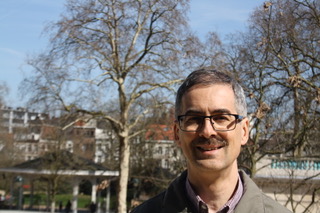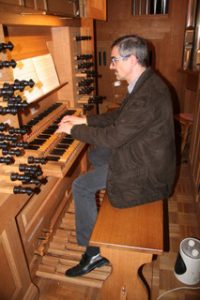
Daniel Vanden Broecke has been an active member of FRH since 2016. His passion for music and organs makes him bring to the organization a strong musical approach within the European Cultural Religious Heritage, raising awareness of our sacred music and its centenary instruments. Most of them spread in different cathedrals and churches of the whole of Europe, Daniel knows then well.
He studied at the Lemmens Institute in Leuven with Jozef Sluys, Joris Verdin and Reitze Smits and obtains the diploma of “Laureaat Organ”. From 1990 until 2013 he has been the Organist at the Church of the Nativity of Our Lady in Hoboken (Antwerp). He was also connected as a teacher to the Academies for music and Word Berchem, Hoboken and Merksem (city of Antwerp) and at the “Antwerpse Volkshogeschool” as a course supervisor. Since 2000, he has been working in the sector of organ heritage (first by “Vlaams Instituut voor Orgelkunst” that merged in 2005 with “Het Orgel in Vlaanderen”). From 2009 he has been the project coordinator at “Het Orgel in Vlaanderen” (Flanders) and coordinates projects to reach new audiences for organ and organ heritage. To realize this, he collaborates with HERITA and other heritage associations at home and abroad. For many projects, no prior knowledge is required.
-Dear Mr, Vanden Broecke…may I call you Daniel?
Of course.
-Is music a lifestyle to you or a business plan?
Definitely a lifestyle. You become a musician out of love for your instrument, and usually only then do you think about whether you will earn enough to live with it. I have already come a long way – teaching, being an organist at a church, … at a certain point, I had the opportunity to develop projects around the organ. That’s how I got to the “job of my life”, as we say here in Flanders. At a certain moment, I saw the need to link the organ to heritage. Some organists are, or were still, in the philosophy of “my organ under the church tower”. But if you don’t begin to see organs in a broader context, you risk the destruction of the entire culture of organs. Moreover, you can learn a lot from other sectors to safeguard the future of organs. That has given a huge boost to Het Orgel in Vlaanderen where I work. It became a kind of expertise centre. That is how my job became my passion. When I see what kind of network I have built up in the meantime and have worked out the amount of projects we do, I can only be very happy. Naturally, the pleasant contacts with people from all sectors and even different countries (through our network) are added to that. A colleague of mine always said that I have an “unstoppable enthusiasm” for the organ.
–Bon Jovi, Daniel Vanden Broecke, Jean Michel Jarre…you all have something in common, no?
I think all three of us are passionate about our profession. We go for it, like everyone in our field of work. All three of us also want our audience to enjoy our talents. We want to let our audience enjoy music, and we give the best of ourselves when we play. I myself don’t play that much in public, but I still want to bring my listeners pleasant music played with a lot of feeling. Likewise, when I talk to people about organs, I give the best of myself to convey my passion. Additionally, my eldest daughter told me that we also have the name “Notre Dame” in common, because Jean Michel Jarre gave a concert in a virtual Notre Dame Cathedral in 2020, I have been closely following the situation of Notre Dame’s organs after the fire, and the son of Jon Bon Jovi plays with an American football team called “Notre Dame”.
-Could you please, share with us your favourite melody…
That’s a tough one. There is so much beautiful music from the different periods that choosing one is not easy. But one of the pearls of organ music for me is a composition by J. S. Bach, Prelude and Fugue in E-Flat Major BWV 552. Perhaps not directly a work to get acquainted with the organ, but it is a sublime composition. After a while you experience the timelessness of the piece- it never starts and never ends, everything flows in a beautiful movement.

-As a child, was there a specific moment in which you decided to be a musician. Why would you choose the organ and not the piano?
Like most children, I was obliged to learn the piano at home. In the beginning, I didn’t like it that much, but after a while, I started to like playing it. At the same time, it was still the custom to go to mass every week and we were lucky enough to have a professional organist to play at the services. Thus, gradually the interest in the organ arose. Since my father also knew the organist, as a fourteen-year-old I was allowed to regularly see how he played and from time to time I was also allowed to play a piece by Bach, that I played on the piano, on the organ. And so the love for the organ came to life. The enormous sound possibilities and the impressive combination of hand and footwork was also interesting. There was also the “mythical” Lemmens Institute in Leuven where organists were formed. Both the organist of my parish and my organ teacher had graduated from there. My fifth-grade teacher taught there and gave me the information because he saw me become a professional musician. After this, I was completely convinced and my dream came true.
-Do you have any advice for the parents reading this?… as children nowadays have more difficulty in finding the organ to be something interesting to study, is there something they could do to inspire them?
There are 2 things that are important. On the one hand, parents must understand, and also impart to their children, that an organ is part of the liturgy, but that it is also separate from religion. A lot of organ music has been written that is not intended for liturgy and services. On the other hand, I notice that in Flanders, for example, organs are much more accessible to play and study. If organ teachers and organ societies still put in enough effort to promote the organ through activities such as visits to an organ and how they are built, then it will be fine. In Flanders, more than half of the organ students at music academies are under the age of 30, and a large proportion of them are still under 20.
-What would happen if no children wanted to study the organ; would all the organs of Europe would remain mute forever?
That is indeed what could happen. It is therefore of vital importance to bring as many people as possible into contact with the organ so that in the future, enough organists can be available to play the organs. They don’t all have to be professional organists, mind you. As a jury member on various examination boards, I have already noticed that some non-professional organists play better than professional ones. It is therefore also very important to make the training courses in ordinary music academies in such a way that graduates know perfectly how to play the organ and know what maintenance is required, among other things.
-We know your heart suffered with the tragedy of Nantes cathedral. Why do these things still happen in the Europe of the 21st century?
There are different kinds of tragedies regarding heritage. In some instances, there is heritage that gets destroyed due to a lack of adequate security measures. The owners are in a way responsible for that and those are things that can be avoided. Others are due to unfortunate circumstances, such as the fire of Notre Dame. A great deal has been saved thanks to the enormous efforts of the fire brigade. Finally, there are catastrophes like in Nantes where people consciously destroy heritage. There are no words for this. This organ is irretrievably lost. Even if you make a reconstruction of the instrument, nothing can replace the original. Preventing such things is very difficult. I think that making society aware of the importance of heritage could be part of the solution. But if people consciously or mentally want to destroy something, there is little that can be done. Only adequate protection can help here.
-Professor Campuzano, president of the Spanish Organ Association, and also an expert in the field, said to FRH that many musicians of our history learn to play piano thanks to the organs of their religious heritage.
That could be, but I have not noticed it that much in my environment, it is actually on the contrary. After a while, many pianists start studying the organ. What I regularly notice is that there are many regional differences in Europe in connection with organ students, how organs are protected or not, etc.
-We know you participate actively in school workshops, what is your honest and personal impression on the attitude of these young people once you put them in contact with this instrument? Does it change their perception of it?
Absolutely. We use a box with a small organ (provided by the Orgelkids project) that the children can assemble themselves. In this way, they learn how organs are built and, to a limited extent, sound. If you combine that with a visit to a large organ, a whole world opens up for them. They see the instrument in itself and not as part of religion. I certainly do not want to deny the inseparable bond of organs and liturgy, but in this way, the organ becomes an instrument for the children like any other on which you could also play children’s songs.
-And what about you? What is your impression after they leave? How do you feel about your task?
It gives me great satisfaction when I notice how people and children get to know the organ in a different way through our projects. I like to talk about the “wonderful world of the organ”. When you enter a church you see the front pipes of the organ. But organs are more than some pipes that you see from below. it is also a world of ancient technology and history. A few years ago, I did various activities for an international group of young people between 16 and 18 years old. During the first session, we visited BOZAR in Brussels, where a brand new organ was placed in the hall where the famous Elisabeth competitions take place. The second session was building the small organ and finally, we visited an organ builder during a third session. At the farewell, several participants said that if they entered a church and saw the organ, they would see with completely different eyes.
-As citizens of Europe in 2020, are we aware of the threats this common heritage has to face day by day?
Yes and no. Many volunteers and professionals are already working to safeguard heritage for the future. Projects like the European Heritage Days help with this. But there is still the threat from project developers to realize certain projects at the expense of heritage. In the future, it will be important to mobilize the local communities around their heritage and to involve them in the future of their heritage. They can help as volunteers, guides, reception staff, etc. In this way, the stories around buildings can be further told. In Flanders, I also see projects in which valuable buildings and heritage are given a new meaning and purpose by project developers. And admit it, staying overnight in a historic monastery or having an office in an old castle, who says “no” to that? Exchange of expertise and examples across Europe and the world can only benefit religious heritage.





Follow us: